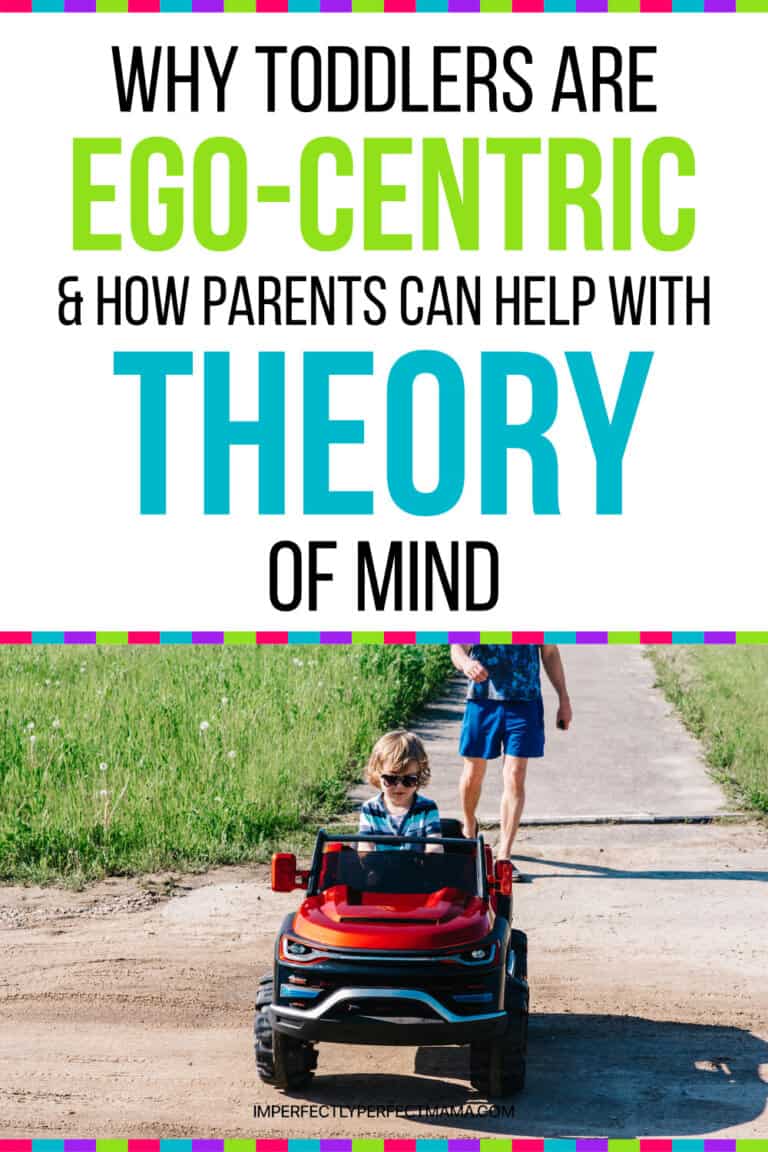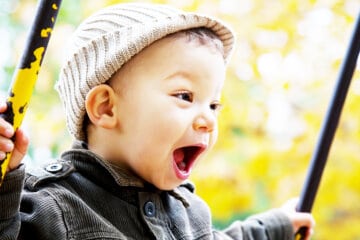If you’ve ever spent five minutes with a toddler, you know that they can be, well, let’s just say self-centered.

Every tantrum, meltdown, and refusal to share can make it seem like our little ones are incapable of empathizing with anyone else’s feelings but their own.
But before you write them off as tiny (and cute!) monsters, it’s important to understand that this egocentric behavior is actually developmentally normal.
In fact, it’s an essential part of how our kiddos learn about the world around them.
Why is This (Sometimes Very Frustrating) Behavior Normal?
In short, toddlers’ brains are not fully formed yet. The front part of the brain, called the prefrontal cortex, is one of the last brain regions to mature.
This area is responsible for skills like planning, prioritizing, and controlling impulses.
Therefore, your child is physically unable to make rational decisions.
As a result, they often act on their emotions and impulses, which can lead to the dreaded “me monster” behavior.
Theory of Mind
In addition to an immature brain, toddlers are egocentric creatures because they’re still in the process of developing what’s called a “theory of mind.”
Put simply, theory of mind is the ability to understand that other people have beliefs, desires, and intentions that may be different from your own.
And while it might seem like toddlers should be able to figure this out pretty easily (I mean, they see us interacting with other people all the time), theory of mind is actually a pretty complicated concept for little ones to wrap their minds around.
It isn’t until around age 4 or 5 that children become more aware of others’ thoughts and feelings.
This is when true theory of mind emerges.
Fortunately, there are things you can do to help your little nugget develop their theory of mind!
7 Tips to Help Your Toddler Develop Their Theory of Mind
1. Be a Role Model
One of the best things you can do is to model empathy yourself.
When your child sees you being kind and considerate towards others, they’ll start to understand that those same emotions can be felt by other people as well.
Additionally, try to avoid using phrases like “I know how you feel” or “you’re so sensitive” when your child is upset.
Instead, validate their feelings by saying something like, “I see that you’re really sad right now.”
This will help them understand that their emotions are valid and worthy of being acknowledged.
2. Make Eye Contact
Not only will making eye contact with your child help them pay close attention to you, but it will also really queue them into learning facial expressions and body language.
This will be key in helping them understand others’ thoughts and feelings.
3. Use Simple Language
When you’re talking to your child, use clear and concise language. Try to avoid using words like “think” or “feel,” as these can be confusing for little ones.
Instead, opt for phrases such as, “I see that you’re upset because you wanted the toy.”
Also, be sure to mirror your child’s emotions. So, if they’re happy, use a happy tone, etc.
4. Read Books Together
One of the best ways to help toddlers develop a theory of mind is to read books together. Look for stories with characters who have distinct personalities and points of view.
As you’re reading, point out how the characters feel and why they might act the way they do.
This will help your child understand that other people have different thoughts and feelings than they do.
It can also be helpful to relate a character’s emotions with your child’s own experiences.
For example, you can say, “I think Splat the Cat is frustrated because he can’t reach his toy. Remember when you wanted your ball off the top shelf and couldn’t get to it? You were frustrated too”.
5. Play Pretend!
Make-believe games are another great way to encourage your child to think about other people’s perspectives.
When you’re playing together, take on different roles and talk about how your character is feeling.
You can also invite your child to explain what they think your character is thinking or hoping for.
This will help them understand that people can have different thoughts and feelings even when they’re in the same situation.
6. Add Emotions to Your Conversations
This will get your child to think about how and why others have emotions different than their own.
Instead of saying, “Emma enjoys playing with the ball,” say, “Emma looks happy. She must enjoy playing with that ball.”
Also, help your child to understand that sometimes people have more than one feeling at the same time.
For example, you could say, “I see that Jason is happy AND excited. He’s probably looking forward to his birthday party tomorrow.”
7. Be Patient and Kind
Lastly, don’t forget to give your toddler lots of love and patience. Despite their egocentric behavior, they really are just trying to make sense of a confusing world.
And with a little help from us, they’ll be on their way to being kind, compassionate people in no time!
A Word from The Gentle Parent
While it might be frustrating to deal with your toddler’s “me monster” behavior, remember that it’s just a phase and perfectly normal for toddlers—in fact, it’s an essential part of their development!
By being a role model, making eye contact, using simple language, reading books together, playing make-believe games, and using emotions in your everyday conversations, you can help your little one develop their theory of mind and become more aware of other people’s thoughts and feelings.
Just be patient—they’ll get there eventually!
For more information about this totally normal behavior, check out my complete guide to why children tantrums and how you can help.
Do you have any tips for dealing with the “me monster”? Share them in the comments below! And as always, thanks for reading!
Finding it tough to discipline your toddler? Unsure of how to go about it in the most gentle and effective manner? Check out these 3 easy steps to disciplining your toddler (gently 😊).




Leave a Reply